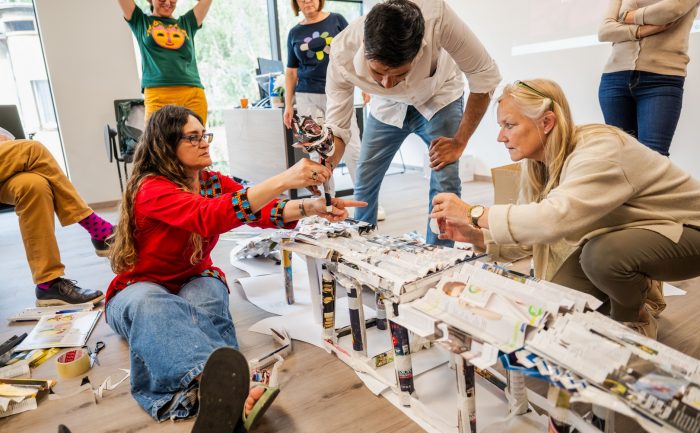Blended Intensive Program Focused on Improvement of Language Teaching

On 3–7 June, Vytautas Magnus University (VMU) hosted blended intensive program (BIP) for lecturers titled SALT: Strategies advancing language teaching, which welcomed language lecturers from Poland, Germany, Ireland, Ukraine, and Lithuania. The program was organised by the Transform4Europe Aliance and the VMU Institute of Foreign Languages.
During the event, the lecturers from the VMU Institute of Foreign Languages shared their experience of language teaching as well as the methods applied while teaching languages at the institute. Each day of the program was dedicated to a different subject: multilingualism and mediation, tools of information and communication technologies and artificial intelligence, flipped classroom, tools for the improvement of various skills (reading, writing, speaking etc.) and non-formal language learning methods.
“I think we managed to reach the goals, because the participants got very actively involved in activities and discussions, shared their insights, experiences, and activities. Moreover, the lecturers will have to each prepare two exercises while applying the methods and tools discussed this week; therefore, the final product will be an e-book with the activities that each participant will apply in their own context”, one of the event’s organizers, the head of the VMU Institute of Foreign Languages, Dr. Teresė Ringailienė, said.

Introducing the more interesting language-learning strategies, Dr. Ringailienė claims that it is particularly beneficial to employ the strategy of flipped classroom, which is based on active use of language during the lecture while performing team-based tasks: not by doing exercises, but by using the language while imitating ordinary real-life situations. Another strategy is functional language teaching, which is based on the function which one wishes to be capable of performing while using that language. Language-teaching strategies that encourage and enable multilingualism are a sufficiently new and widely discussed language-teaching methodology. For instance, “awakening by languages” stands out due to the fact that the learners’ native languages are used as a source of learning (teaching) which helps in the development of language-sensitive teaching and motivates one to be proud of their native language.
“Of course, like in many other fields, language learning is being significantly transformed by artificial intelligence; therefore, the training focused a lot on AI-generated content: how it can facilitate the lecturers’ preparation for lectures and improve the students’ language skills”, the Director of VMU Institute of Foreign Languages noted.
The lecturers who participated in the blended intensive program (BIP) say that the event left a particularly strong impression: not just because of the VMU professors’ lectures and illuminating insights but also the chance to get acquainted with other lecturers who came from different European countries as well as an interesting cultural program.
“The organizers prepared some events outside to “taste” Lithuania, we went to the country, to the straw gardens, which was also a very nice experience. The atmosphere was really great, all the people were very open and approachable, I think we will stay in touch with them. We had fun, we learned something. It was my first time in Lithuania, I hope that I will come back here again”, one of the BIP participants Urszula Michalik, a lecturer from the University of Silesia in Katowice (Poland), said.

Other lecturers who took part in the program also shared positive feedback. Christina Reissner, a lecturer from the University of Saarland (Germany), pointed out that, thanks to the event, she discovered many interesting new things about teaching, communicating with students, and better motivating them. “I enjoyed being here with all the colleagues from everywhere. It’s perfectly organized, and the staff is so open-minded and friendly. Everything was very fun”, Reissner summed up.
In the final presentation of the program, Dr. Ringailienė shared her insights on non-formal/informal language teaching formats that are often utilised by the VMU Institute of Foreign Languages. The institute organizes initiatives that help people get acquainted with various cultures and languages, learn new words, find friends, and communicate with international students. These events include the annually celebrated European Day of Languages and the International Mother Language Day, as well as tandem learning of Lithuanian-Ukrainian or Spanish-English languages, online event series Language Taster, the Primavera En Español festival organized by the VMU Miguel de Cervantes Spanish Language and Culture Club and many other events.






















